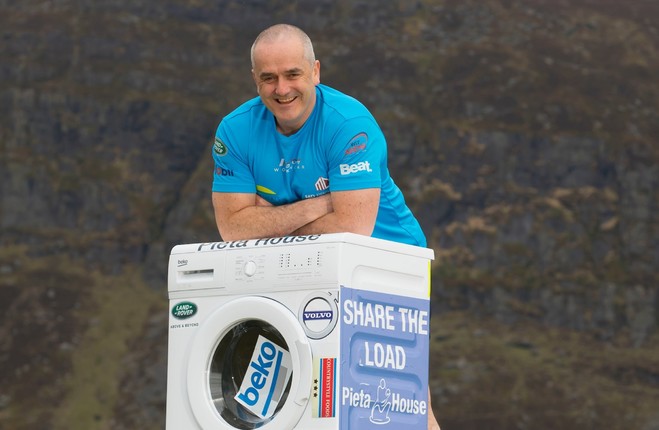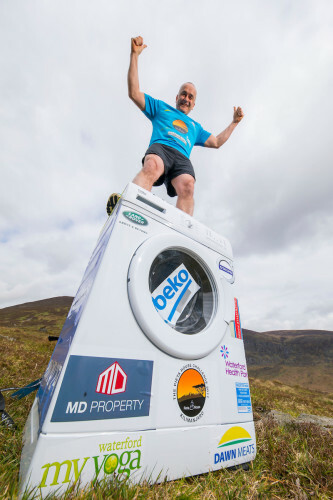Updated at 15.00
“BE HONEST AND reach out to people. If you have a mental difficulty, are under pressure or are carrying a load that nobody can see and that’s too much for you, put it down – reach out and ask for help.”
Enda O’Doherty’s message is a clear and simple one: when it comes to your mental health, don’t carry the load – reach out to others. “It’s okay not to be okay,” he says.
With muscles popping from every corner of his body, the 49-year-old Waterford geography teacher is built like an industrial machine and emits an inspired determination which has seen him battle his own demons with alcoholism many years ago.
In aid of Pieta House, the national charity helping people in situations of suicidal distress and self-harm, O’Doherty aims to climb Mount Kilimanjaro in Tanzania – with a washing machine strapped to his back.
By now he is used to the dumbfounded response, and is kind to offer an explanation as to why he chose a 40 kilogram hunk of metal strapped to his back.
“Firstly it is being used to get media attention – and it’s working”, he says between occasional winces of pain as he undergoes his weekly physical therapy.
“Between CNN, Sky News and RTÉ – many different media outlets have all been covering it. The washing machine is meant to be a media mechanism to get people’s attention, because while suicide and mental health affect so many people and villages and towns, you still have to have a hook to get people to talk about it.
“It’s also an ice-breaker. It’s quite difficult for people to talk about depression or anxiety or suicide and the washing machine in a way defuses that. Most people just laugh when they see me, thinking where’s this nutter going with the washing machine, so it’s a nice conversation starter.”
A gimmick, perhaps, but an effective one with a genuine message in mind. His journey is a personal one.
“I’ve lost two students to suicide in the school that I’m teaching,” he says. “I saw the mother at one of the funerals and saw that she had lost her son – had lost her baby. I walked out of the church that day and knew I couldn’t just sit at home and pretend that this goes away. I knew that I had to do something.
“My other motivation would be that I’m an alcoholic. I had no mental health issues when I was drinking. It was only after I stopped that I realised I had anxiety and depression and a drinking disorder. At that time I was in a world of hell and that’s where I made a promise to myself that if I got out of this mess I was going to make an attempt to help other people get out of that place.”
Enda has form for carrying his washing machine distances. He previously brought it to the top of Mount Slievenamon in Tipparary while in 2015 he walked from Belfast to Waterford – an equivilant distance of nine marathons – where he not only lost all of his toenails, but broke both his feet.
However he maintains that he can stand the physical pain and is willing to endure it if it means bringing attention to a matter which is close to his heart.
“One in four people in their life suffer from a mental health issue. You can’t divorce yourself from that and just say oh it’s just those people. It’s your brother, it’s your sister, it’s your mum, it’s your dad, boyfriend, girlfriend – it affects people you care about.
“Some people would say to me that I’m open to abuse standing there with the washing machine. But I’ve found – especially with teenagers and young people – that they are so helpful and respectful and inquisitive and appreciative of what I’m doing.
“A person came up to me at one of our first fundraisers and said ‘jeez I didn’t realise you were going through such hard times’. And I said that that’s the whole point – I wouldn’t have told anyone and would have kept it to myself to the point where I would’ve taken my life.
“He said he would have helped if he knew and I told him that’s the key issue: I wasn’t asking for help. People need to speak up when they’re in trouble.”
His training regime is all building toward’s July’s 12-day trek up Africa’s highest mountain. Earlier in the day his routine consisted of a 90kg bench press for 25-30 reps, 70kg overheads for 30 reps, 300 push-ups, 300 back extensions with a 50kg plate and 70 kg on a steps machine for 50 reps (which is done wearing an altitude mask).
“It makes me look like Bane from Batman”, he laughs.
The mask is used to put his heart rate up, placing him in aerobic distress which replicates the altitude of Mount Kilimanjaro, creating a claustrophobic sensation of drowning.
“I’ve been training for Kilimanjaro for over 370 days and I’m absolutely broken,” he explains. “I was in the gym for an hour this morning and will go for another hour after physio – I’ve been doing this routine for a year.
“While I’m sore from top to toe… if you saw the emails and the phone calls I’ve received from people who have lost sons and daughters, or from people who are going through a bad time, you are at the very least giving them a smile and at most are giving them hope – that’s what drives me on.
“There are guys coming with me who are half my age and double my fitness levels, but I just want to get to the top of the mountain and get that photo to give people hope.
“The first thing I’m putting into my bag to bring to Kilimanjaro is a brand new Irish tricolour. I can feel the wind in my face, I can see myself standing at the top of that mountain at dawn in Africa on top of that washing machine with the tricolour over my head.”
While he is the driving force behind the Pieta Challenge, he says he is not alone and that the weight is not solely on his shoulders. With him will be a group of 35 people who have each raised €4,000, all of which will be donated to the charity.
“Every single euro that was collected from the public is going directly to Pieta House. Each person has raised €4,000 of their own money to travel. I set that target because the average cost of treatment for someone who is self-harming or suicidal in Ireland is about €1,000 euro.
“So when people contacted me I asked them not to raise money, but to save four lives. As it stands when we depart Dublin Airport we will have 130 lives we could say we were responsible for saving.”
His challenge begins on 3 July and consists of a seven day hike towards the 19,340 ft summit, each step of the way with his washing machine strapped to his back. A weight, he says, worth bearing.
If you need to talk, contact:
- Pieta House 1800 247 247 (suicide, self-harm)
- Samaritans 116 123
- Aware 1800 80 48 48 (depression, anxiety)
- Teen-Line Ireland 1800 833 634 (for ages 13 to 19)
- Childline 1800 66 66 66 (for under 18s)
You can support the Pieta Challenge here
The42 is on Instagram! Tap the button below on your phone to follow us!


